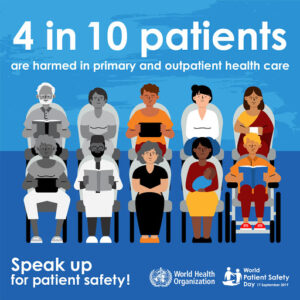PATIENT SAFETY

The simplest definition of patient safety according to World Health Organization, is the prevention of errors and adverse effects to patients associated with health care.
Unhealthy conditions of the body or mind displace people from the normal state of health thereby deterring their physical or mental wellbeing. It is expected for such individuals to seek out solutions to their health challenges through different means available and accessible to them. Nowadays, people utilize the health services of trained medical practitioners to recuperate and expect that they will be cared for in a safe manner. Unfortunately, there are so many recorded cases of medical negligence resulting in injury or death of patients.
Thomas Agan, the Chief Medical Director (CMD), University of Calabar Teaching Hospital (UCTH), once said during an interaction with journalists in 2017 that over 90 per cent of deaths recorded in Nigerian hospitals are due to poor attitude of health workers. He also mentioned that until healthcare providers are held accountable for every challenge they create, things will not go down well.
Trained medical professionals legally owe a duty of care to their patients. Universally, Medical practitioners are governed by the Hippocratic Oath pledged at serving humanity with optimum capacity. One of the several laws governing medical practice in Nigeria is Medical and Dental Practitioner Act (CAP M8), structured to regulate medical ethics and rules of professional conduct. Infringement of this duty through medical malpractices such as wrong diagnosis and treatment, polypharmacy, defective medical products, and other illegal practices resulting to some form of damage to the patient qualifies as medical negligence. It is pertinent to understand that medical negligence is not exclusive to medical doctors but includes nurses, technicians, pharmacists and other health care providers.
It is no news that a lot of progress needs to be made as a nation in providing an enabling environment with modern and innovative equipment to aid medical practitioners in carrying out their duties. Doctors in government hospitals constantly have to demand adequate remuneration, but some health care providers now use this as facades masking so many cases of medical negligence.
Maintaining patient safety and care requires cooperative effort from all health care providers responsible for patient care. Team work not only provides the safest care but improves medical management especially in diagnosis and treatment of patients. It may not be totally possible to eradicate crisis emanating from medical negligence but, with quality health care work force, the right hospital leadership and management, and the right health care facility and infrastructure, it can be controlled.
Developing active networks of patients and providers, sharing experiences, learning from failure and pro-active risk assessment, facilitating effective evidence-based care, monitoring improvement, empowering and educating patients and the public as partners in the process of care are some of the key factors to consider in achieving a quality agenda.
Monday Health Burst is an initiative of Centre for Family Health Initiative (CFHI) to tackle issues of basic health concerns. Join us every Monday for more health-related articles on all our social media platforms.


